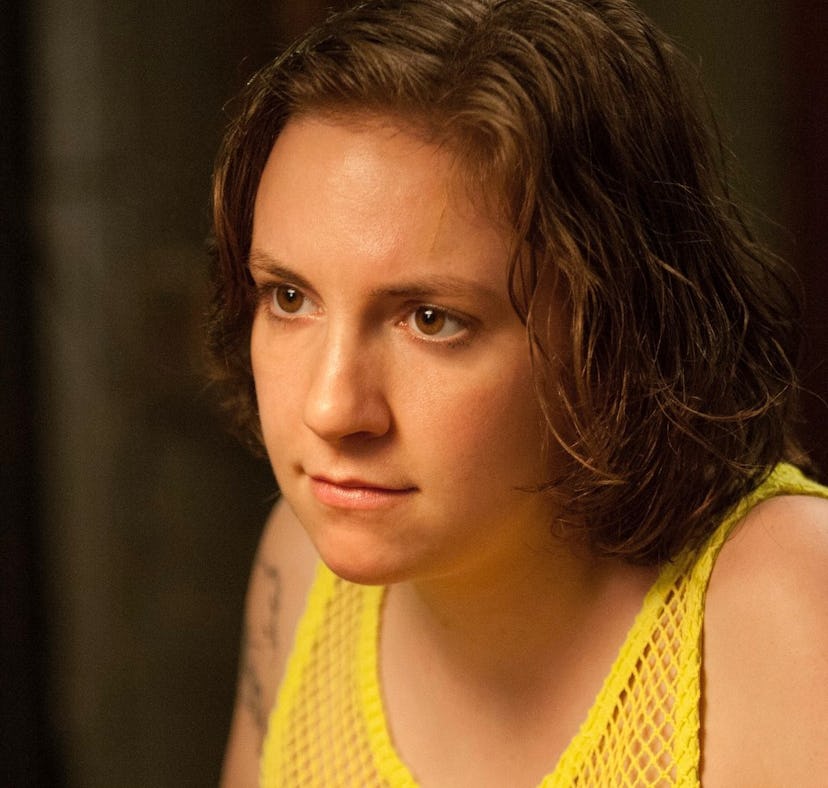
TBH, Hannah Horvath Wasn’t So Bad
Why Girls’ problematic protagonist deserves a second chance.
All over my For You page, my fellow Gen Zers are stitching reactionary clips that mock Marnie’s cringey cover of Kanye West’s “Stronger” in Season 2 and applauding that epic Season 3 Shoshanna/Hamptons takedown. TikTok users are tagging their BFFs in the comments, debating which of the four main characters exemplifies them the most. The great Girls rewatch of 2023 is real, not just a fever dream flashback to 2012 Tumblr.
I was 15 when Girls first aired. What drew me in was the aspirational story about millennial BBFs coming of age in the big city. But honestly, the challenges they faced made it hard to watch. Their love lives were sloppy, they were (self-admittedly) terrible friends to each other, and the nudity — which there was plenty of — was a lot. Mostly, I thought the girls of Girls were just incredibly whiny.
Despite its mixed reviews, I went into the show rooting for Hannah, relating to her as an aspiring writer myself. I smiled when she told her parents, “I think that I am the voice of my generation or at least a voice of a generation.” But as the show went on, I grew more disappointed than inspired by her lack of seriousness and her inability to maintain work and receive criticism. In her personal life, she was always either coming down on or ignoring Marnie. And through their many breakups, I often thought Adam was the hero and Hannah the villain — and headlines like “Hannah Horvath, Why Do We (Still) Hate Thee So?” demonstrated I wasn’t alone in that thinking.
Amid a rewatch now in my mid-20s, I found what I thought was impossible: empathy for Hannah. Despite Hannah’s laissez-faire attitude about life, the way she faced her romantic relationships and work struggles now echoes my inner thoughts. As TikToker Keara Sullivan recently joked, “Hannah Horvath needs to stop being so relatable. I’m relating too hard and because of this I fear that I might actually be annoying.”
When Hannah described her relationship with Adam saying, “I feel as though I made him up,” only to flip the switch, cry, and tell him, “I’m scared,” it sounded similar to the messiness of situationships I’ve found myself in — something most Gen Zers can relate to. It screamed “great resignation” when she quit a high-paying job at GQ because she wanted to find her voice instead of writing branded content. My newfound love for Hannah got so real that for my recent birthday, I added the “Birthday B*tch” baseball hat she wore at her 25th birthday party to my Amazon cart.
Before Girls, the female protagonists I watched were 2000s rom-com darlings like How to Lose a Guy in 10 Days’ Andie Anderson and Gossip Girl’s uber-stylish Blair and Serena. Their misdeeds were charming because their hotness, by mainstream beauty standards, exempts them. Girls was the first time I saw women be so open about their sexuality and, frankly, bear real bodies. The girls of Girls did not say the quippy, funny, perfect thing at all times, and their wardrobes were far from idyllic (think the Urban Outfitters sale rack in 2012, per Lena Dunham’s characterization of Hannah). They were inappropriate and foul-mouthed, and they lied, cheated, and betrayed each other. They embodied the “unlikable woman.”
Gen Zers like myself have an appetite for antiheroine main character energy, precisely what Hannah embodies. “I am the voice of my generation” accurately reflects the low-key narcissistic confidence and romanticizing of life so many Gen Zers express on TikTok. The many isms of Hannah have people declaring they’re in their “Hannah era,” a phrase used to define her exaggerated sense of self-importance. And upon the Girls resurgence, I’ve realized I’m one of ‘em.
It’s her bravado, but also her contradictions that make her so compelling. For all her ambition and confidence, she’s even more insecure. In Season 1, when Hannah and Marnie fight over who is a worse friend, Hannah yells, “No one could ever hate me as much as I hate myself… any mean thing someone’s gonna think of to say to me, I’ve already said to me, about me, probably in the last half-hour.”
My Girls rewatch did me a greater service than provide mere entertainment. In finding empathy in Hannah, I got validation about the sloppy uncertainty that comes with adulting. Episode after episode, I (involuntarily) saw flashbacks to times where I did something embarrassing IRL, like oversharing at work or to strangers at a party, texting someone who ghosted me in the middle of the night, or screwing up an interview — stressful moments that made me wince or feel ashamed.
As Shoshanna realizes in Season 4 (“I just don’t understand why nobody tells you how bad it’s going to be in the real world.”), growing up is hard. But as the girls of Girls eventually learn, your 20s are meant to be a time to make mistakes and risk being unlikeable. Yes, the Hannah Horvath era might as well be called the cringe era — and that’s exactly the point.